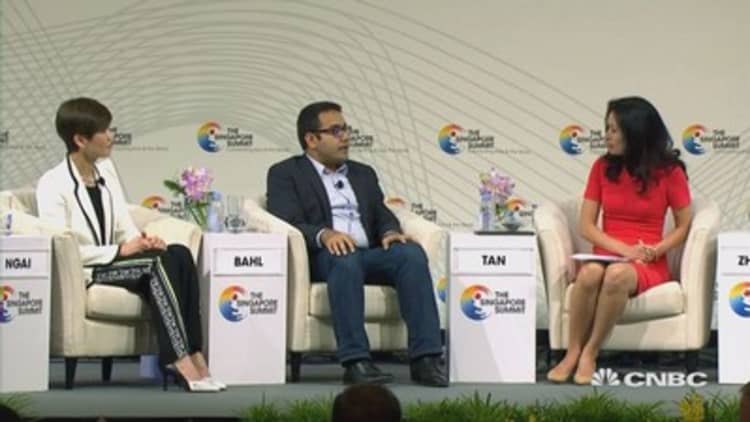
Socially conscious, more willing to spend and highly digitally connected.
Descriptions of millennials and their spending habits often run the risk of resorting to stereotypes but for businesses operating in Asia, these qualities remain key in guiding customer engagement strategies.
Home to almost 60 percent of the global millennial population—typically described as those between the ages of 16 and 35, emerging Asia is fast turning into a battleground among both traditional and online retailers for the hearts (and wallets) of consumers. Key reasons for the region's appeal: The rapid rate of urbanization, as well as the large youth populations, which are expected to translate into a larger consumer base when they come of age.
"Chinese consumers [are] in the process of consumption upgrading. People are basically changing their lifestyle[s]," said Daniel Zhang, chief executive officer of Alibaba, during a panel session at the Singapore Summit held at the Shangri-La Hotel.
One of the brains behind the creation of the now legendary Single's Day shopping event, Zhang said that the reason for its inception was to have people remember Alibaba's at-the-time new business-to-consumer Taobao Mall (now rebranded as Tmall) platform. "The reason we created [Single's Day] is probably for one thing, it's for survival," he said.
Last year alone, Alibaba attracted 434 million active buyers, according to the company's annual report. Of these shoppers, 80 percent were aged below 35, Zhang said.
To cater to the digitally engaged demographic, Zhang highlighted how an Alibaba merchant last week conducted a livestream with the newly-minted Olympic Chinese women's volleyball team and reached millions of customers.
"This is not purely for gaming [or] for interaction. This is also for sales," Zhang said, "This sells tons of that product … within 30 minutes."
Another emerging market on consumer businesses' priority list is India. Around 250 million people in the country own smartphones although half of them do not have access to data, said Kunal Bahl, chief executive officer of Snapdeal .
While infrastructure issues and remote rural populations might present logistical challenges, they also present opportunities for businesses, such as the online marketplace Snapdeal, to develop solutions that differentiate themselves from the competition.
"Indian e-commerce is where Chinese e-commerce was in 2007 or 2008. We are about 8 years behind but it's not going to take us 8 years to bridge the gap," said Bahl, highlighting the pace of 4G network expansion taking place in India.
As for what Asian consumers want, change appears to be the only constant, said Malina Ngai, chief operating officer of the A.S. Watson Group, which operates the Watsons chain of drugstores.
"The cycle of planning is really, really short," Ngai said, "These days, no one can see for more than 10 years … We review the plan [every quarter] just to see where the customers are going and what we need to do to really get customers shopping more."
Bahl, the CEO of Snapdeal, agreed, "Three years ago, I [kept] saying Indian consumers are all about ABCD: astrology, Bollywood, cricket and discounts … Then it became speed of refunds and returns. Now, it's becoming who can offer next-day delivery coverage."
In addition, Asian consumers prefer goods that appeal to their "sensorial expressive side" , said Magesvaran Suranjan, president of Procter & Gamble Asia Pacific.
"The products have to have a certain richness in perfumes [in Asia] than in the West," explained Suranjan. Packaging also has to be more vibrant than in the West to appeal to Asian consumers, he said.
"Consumers in Asia want the best … They don't want emerging market service, they want developed market services but at emerging market prices," Snapdeal's Bahl said.



